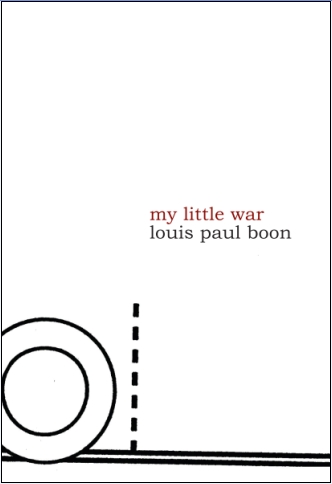
by by Margaret Kolb

Published by Dalkey Archive Press, 2010 | 136 pages
Anglophone readers can be forgiven if they’ve never heard of the Flemish novelist Louis Paul Boon (1912-1979), who, despite having written an enormous amount over an extensive career, remains almost entirely untranslated in English. Boon’s early novels were conventionally structured historical treatments of nineteenth-century working-class life, but his exposure to major modernist figures such as Céline, Joyce, and Dos Passos changed his literary direction; he would go on to produce such modernistic fare as Chapel Road, Summer in Termuren, and My Little War. These novels, considered major classics of Dutch literature, remain almost unknown in the English-speaking world.
Thankfully, Dalkey Archive Press has begun to remedy this state of affairs, re-issuing a 1972 translation of Chapel Roadin 2003 and publishing the first English translation of Summer inTermuren in 2006. This year, Dalkey continues their introduction of Boon to Anglophone audiences with the first ever translation of Boon’s scabrous account of World War II, My Little War (1947).
My Little War is comprised of 31 chapters over a brief 120 pages, and consists almost entirely of short and bracing anecdotes and character-sketches detailing scenes from a town in German-occupied Belgium. And indeed, from the first page, Boon announces his project as a fragmentary and local one, an anti-epic: “A little writer writes his little war but what great writer will rise up now and present us with his Book About the Great War—with capital letters?” Not Louis Paul Boon. Presented as notebook sketches compiled by a writer-figure named Louis, these brief set-pieces, written in a colloquial vulgate nicely rendered by translator Paul Vincent, accumulate to form a vivid depiction of life under military siege.
Boon’s tone is tragicomic, his characters at once grotesque, laughable, and terribly vulnerable. Sneering sarcasm can give way to moments of pained sincerity, as when Louis wonders “whether I’d been put on this earth just to witness one [war] after another.” A kind of wartime dirty-realism alternates with frame-breaking direct addresses to the reader, in which the narrator provides commentary on or even contradicts his own stories.
If Céline’s Journey to the End of Night is the definitive European novel about the First World War, My Little War stands as a worthy successor about the Second. Clearly, Boon has learned a great deal from Céline, to whom he owes a clear debt for Louis’s narrative voice, issuing somewhere from the spaces between enraged disbelief and defeated resignation.
Boon frequently follows the short sketches that make up the bulk of each brief chapter with series of italicized paragraphs, each containing mini-narratives of their own, unconnected to the larger sketch. Such paragraph-long short stories, peppered throughout, constitute a kind of chorus within My Little War, and a constant reminder that this account of the occupation is of necessity incomplete, fractured, arbitrary. Indeed, the novel’s italicized sections extend and condense the formal logic governing the book as a whole; one could easily imagine an even littler My Little War consisting only of these tiny tales. The cumulative effect of these choruses is the closest Boon comes to approaching something like epic sweep, as if the narrator were an aerial camera panning from one local tragedy to another.
Throughout My Little War, Boon remains deeply attentive to the registers of common speech, noting with dark comedy, for instance, “how wonderful popular expressions can be: a plane that’s been hit and comes limping home an hour after the other planes is a plane ON CRUTCHES.” Throughout the text the novel’s authorial stand-in, Louis, consciously distances himself from the pretensions of high aesthetic culture and instead aligns himself with the popular, at one point, for instance, valuing the jazz he hears on the radio above Beethoven and Bach, “who people won’t shut up about and in whom they hear the sea and the forests and God himself, but who just remind me of the saw mill up at Gust Nest.” Louis's emphasis on the popular is not, of course, without political force: to celebrate American jazz singers while rejecting German high-art tradition is, in the Netherlands in the 1940s, to align oneself with democracy against fascism, the Allies against the Axis.
English-language readers have, for too long, known continental modernism as a largely French and German affair, though there is evidence that things are changing. The conversion, in the last ten years, of Polish writer Witold Gombrowicz from an obscure unknown (in America) to a household name is a prominent symptom of this shift. With any luck, Louis Paul Boon will become similarly well known. Paul Vincent’s capable translation of My Little War is a welcome contribution.
Len Gutkin lives in New Haven, CT, where he is studying for his PhD at Yale.















click to see who
MAKE Magazine Publisher MAKE Literary Productions Managing Editor Chamandeep Bains Assistant Managing Editor and Web Editor Kenneth Guay Fiction Editor Kamilah Foreman Nonfiction Editor Jessica Anne Poetry Editor Joel Craig Intercambio Poetry Editor Daniel Borzutzky Intercambio Prose Editor Brenda Lozano Latin American Art Portfolio Editor Alejandro Almanza Pereda Reviews Editor Mark Molloy Portfolio Art Editor Sarah Kramer Creative Director Joshua Hauth, Hauthwares Webmaster Johnathan Crawford Proofreader/Copy Editor Sarah Kramer Associate Fiction Editors LC Fiore, Jim Kourlas, Kerstin Schaars Contributing Editors Kyle Beachy, Steffi Drewes, Katie Geha, Kathleen Rooney Social Media Coordinator Jennifer De Poorter
MAKE Literary Productions, NFP Co-directors, Sarah Dodson and Joel Craig